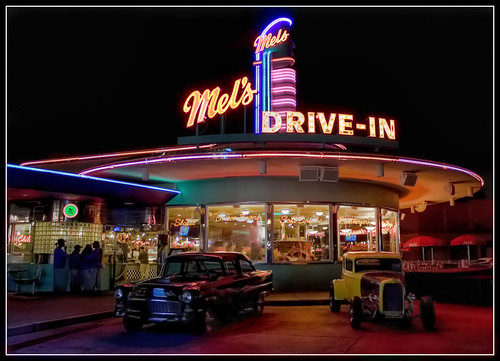
Ads says...
I'd only ever seen one Louis Bunuel film before - his first one, which he co-wrote with Salvador Dali - Un Chien Andalou (the one where the woman gets her eyeball sliced open by a razor), which was made in 1928. 1928! And the dude was still making films in the seventies! What a trooper. So, I guess Un Chien Andalou did actually prepare me somewhat for this film. I didn't realise it, but surrealism is a structural element of all of Bunuel's films, or so I've read.
This film was OK. I didn't love it, but there were some pretty interesting situations and some quite arresting images. Once I was familiar with it I was able to fall into the dreamlike quality of the film, where you never know what to expect and scenes just kind of flow into one another when something random or slightly odd happens. It starts with two couples arriving at the home of another couple for a dinner party, only they've arrived on the wrong night and have to leave and go to a nearby restaurant. The restaurant's closed, but they go in anyway, start perusing the menu and loudly discussing what they're going to drink when they realise that the reason the place is closed is because the owner has died and his widow is mourning his corpse in the next room. I think this was the point where I realised that this film didn't adhere to standard narrative conventions and we weren't expected to be looking for meaning in the film in the same way we would ordinarily. Although over the course of the film there are all kinds of narrative digressions - unrelated stories played out, dreams related by peripheral characters, numerous sequences that just kind of laspe in and out of common sense, the whole thing is played pretty straight.
As for the film's comment on the bourgeoisie and their priveliged place within society, I didn't find it quite as scathing as I was expecting to - I guess their overly self-concerned actions, and the fact that they just kind of float through the film with all these completely random things happening to them without really getting particularly emotionally involved, was comment enough. I didn't feel as though Bunuel was roasting them, but they probably didn't need it. They almost felt like these ghosts that things happen around. I guess the fact that they're never able to actually sit down to a meal and eat is kind of a logical metaphor for their transparence.
The one thing that annoyed me about the film, and I guess it's possibly a symptom of surrealist filmmaking in general, is the fact that it kept relying on sequences being dreams as a narrative device. Once a situation had been pushed to its logical extreme, like a character dying or something completely climactic happening, another character would suddenly wake up, and it would be revelaed that what had happened in the previous sequence was a dream. Although it's arguably a necessary device for such a film, I found it a bit too convenient - "It was all a dream!"... Hmmm, yeah - OK, whatevs... Still, I found this film rewarding without being totally engaged in it.
 Micky says...
Micky says...I would agree that this film is a comedy, because it doesn't really fit under any other genre, but it's more absurdist humour rather than laugh-out-loud jokes. Then again I guess it depends on your sense of humour! Well I wasn't laughing out loud anyhow, but I still found this film engaging and I'm glad that I've seen it. It is a nice looking film though there is some unusual cinematography - such as a fade into a next scene by going out of focus and then coming back into focus for a new scene, and a zoom-in to someone's eyes that are kind of not doing anything. But the house where most of the action takes place, and all of the women's costumes, are just gorgeous.
Ads says I'm not allowed to talk about sleeping in this film but I really have to, because in a lot of ways this film is like a dream - random people pop into scenes (there is a real military presence in this film too, so most of these random people are soldiers), there is a repetitive image that doesn't actually get picked up as part of the narrative, and the characters themselves have dreams so there are several 'it was just a dream' moments.
I know this film is loaded with commentary on the middle class, but I can't quite put my finger on what Bunuel is trying to say - it's not immediately apparent to me. But perhaps what it is about is the lack of depth in the lives of the bourgeoisie, how important appearances are to them, how while they are continually focusing on something as petty as dinner, there is so much more going on in the world that isn't touching them. So instead of them discovering those important things for themselves, the important things come to them - interrupting their potential meals and forcing them to address something besides what's on the menu.




